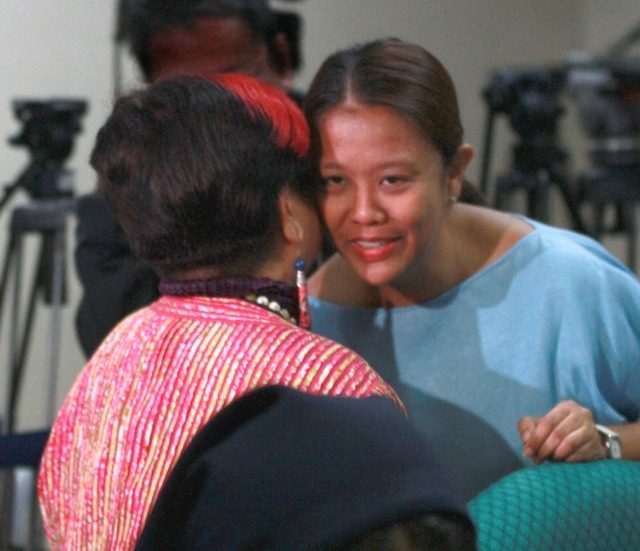SUMMARY
This is AI generated summarization, which may have errors. For context, always refer to the full article.

MANILA, Philippines – What did street families do in a Batangas resort during the papal visit?
Social Welfare Secretary Dinky Soliman earlier admitted street families were taken to a resort from January 14 to 19. The outing, which Soliman called a “family camp,” oriented families on the DSWD Modified Cash Transfer (MCCT) program.
“It was to protect families from hazards, and to give them a chance to receive social services like life skills training and capacity building while they’re in the family camp,” Soliman said during a Senate committee hearing on Tuesday, January 27.
Soliman said the event helped families harness skills in arts, sports, and music. “Para magkaroon sila ng bagong karanasan na ‘di nila nararanasan sa kalsada,” she added. (So they’ll have new experiences which they won’t have in the streets.)

Family experience
Some participants of the “family camp” attended the senate inquiry, presenting two different stories.
Elsa, a DSWD beneficiary, said her family greatly benefits from the MCCT program.
“Nag-enjoy kami. Tinanong kami kung gusto namin sumali sa camp, agad kaming pumayag. Kusa kami sumama, second time namin ito. First sa Island Cove noong 2014,” she added. (We were asked if we want to join the camp, we immediately agreed. We voluntarily went, it’s our second time. The first one was in Island Cove in 2014.)
She stressed some families were able to refuse DSWD, clarifying that they were not forced. These families did not join because their children had classes, according to Elsa.
“But wasn’t it a holiday during the papal visit? No classes?” Senator Nancy Binay asked.
“Nakalimutan nila,” Elsa replied. (They forgot.)
Other parents agreed with Elsa, thanking DSWD for helping them get by through education, health, cash-for-work, and housing assistance.
Binay also noted that some participants were already MCCT beneficiaries, while others were no longer living on the streets. They were allowed to join since the camp activities were helpful to all families, Soliman said.
Meanwhile, Elena Dolfu, another MCCT beneficiary, complained she had never received money from DSWD.
“2013 pa lang [MCCT] member na ko, ‘di ko maintindihan bakit wala akong natatanggap. Wala akong napapala hanggang ngayon, puro pirma at interview,” Dolfu said. (I’ve been an MCCT member since 2013, I don’t understand why I don’t receive anything. Until now, I’ve not benefitted from it; it’s all signatures and interviews.)
Dolfu said street families were told not to bring too many items with them since DSWD would provide everything they need. However, upon arriving at the resort, they were not given enough supplies.
Dolfu complained about the scarcity of milk and diapers for infants, proper clothing, medicine, and even underwear. “Ok ang camp activities, sa needs ang problema. Six days kami doon [resort], third day lang kami binigyan damit,” said Dolfu. (The camp activities were ok, addressing our needs was the problem. We stayed there for 6 days, we were only given clothes on the 3rd day.)
“Parang biglaan lang, hindi preparado ang DSWD,” Dolfu said, describing the scarce supplies available during the trip. (It seemed like it was organized in haste, the DSWD was not prepared.)
The used clothes given to street families came from local donations which were not distributed during disasters, Soliman said.
“Gusto ko magpaumanhin sa kakulangan sa camping. Susubukan naming paunlarin ang mga susunod na camping na isasagawa namin,” Soliman said upon hearing the families’ complaints. (I would like to apologize for the limitations of the camping. We will try to improve the next camping we’re going to organize.)
Soliman, however, stressed the importance of family camps: “Naniniwala kami, batay sa naging karanasan ng marami, na ito ay isang karanasan para mabuo ang pagsasama ng pamilya,” Soliman said. (We believe, based on the experiences of many who participated, this [family camp] is an experience which brings families together.)
“Marahil, hindi ito maintindihan ng marami dahil ‘di sila nakatira sa lansangan, pero sa rami ng nakausap ko, iba talaga ang walang bahay o pamilya. Ang camping ay para makita nila na pwedeng may ganoong lugar. (Others might not understand this since they don’t live on the streets, but based on the many people I’ve talked to, it’s difficult not to have a house or family. Camping is for them to see that there are places like that.)
‘Hidden’
Catherine Scerri of Bahay Tuluyan, the NGO which first reported about the Batangas incident, stressed not all families wanted to join the family camp.
“Some families were told to move from Roxas Boulevard, some stayed behind Ospital ng Maynila during the papal visit,” said Scerri.
“Many felt they had no choice, they felt they were being taken away.”
Binay suspended the hearing, until all necessary documents were submitted. She requested Soliman and MCCT beneficiaries to submit receipts, contracts, and necessary paperwork on family camps, MCCT transactions, and reports.
Soliman then thanked MCCT beneficiaries like Elsa who serve as volunteer community leaders, “Di lang pamahalaan ang kikilos, dapat may kusa rin sila.” (The government should not only be the one to act; they should also take the initiative.)
DSWD is currently working with the private sector and other government agencies in developing sustainable jobs for the poor. It will also look into the cases like Dolfu’s, in which cash grants were either delayed or were never received.
Soliman urged local government units to also step up, praising the Mandaluyong LGU for its comprehensive programs for street families. “Malaki ang hamon, kailangang pagtulungan,” she said. (It’s a big challenge, we need to help each other.) – Rappler.com
Add a comment
How does this make you feel?
There are no comments yet. Add your comment to start the conversation.